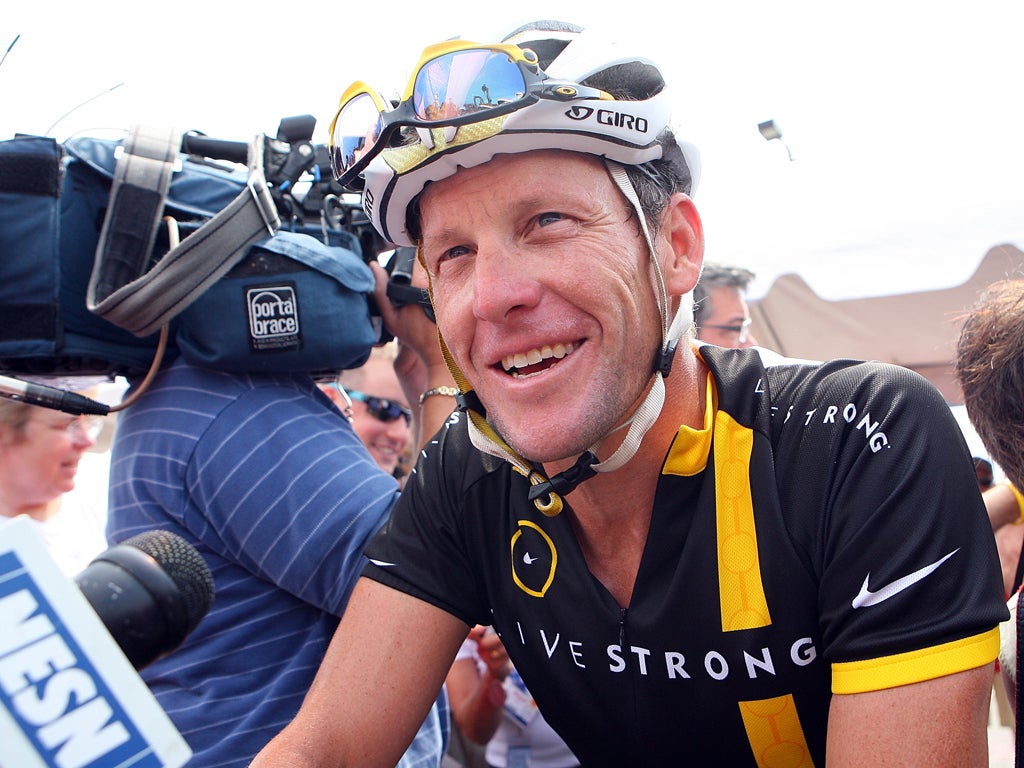The Independent's journalism is supported by our readers. When you purchase through links on our site, we may earn commission.
How Lance Armstrong's drug abuse scandal has battered the reputation of international cycling
Our resident bike nut, who followed the multiple Tour de France winner's career with awe, on the conflicting emotions provoked by the sport's latest drug scandal


So do you think I can get my £7.99 back? That’s how much I paid for my copy of Lance Armstrong’s autobiography, It’s Not About the Bike. A lot of other people did too. It’s not about the bike, Lance? You don’t say!
But as the reputation of the seven-times Tour de France winner lies in tatters, did those of us who bought into the legend ever truly believe in our hearts that Armstrong’s tale of heroism was just that? Pure, unsullied, the product of a physical phenomenon and a strength of character unique in all sport?
Fear
Armstrong always seemed too good to be true. He didn’t help himself by being so chippy. There was something intimidating about him. He looked like he ruled with fear. We partly followed him to see if our suspicions would ever be confirmed, maybe rather hoping that they would be even as we admired his deeds.
Now – spectacularly – they have been, with the US Anti-Doping Agency producing a 1,000-page document that lays out in jaw-dropping detail the systematic programme of doping that it says Armstrong operated, on behalf of both himself and team-mates. Armstrong and his people continue to deny it all, and the politics of cycling are so murky that even now one doesn’t quite know who to believe.
The form of words that Armstrong always chose when confronted with these allegations – to the effect that he had been tested countless times and had never been caught – was never satisfactory, but if being tipped off about upcoming tests was so key to the success of the programme, then that must lead us to ask who was providing that information.
From cycling’s world governing body – the UCI – to the Tour de France organisers via a whole host of coaches, fellow-riders, doctors, and hangers-on – the average cycling observer could be forgiven for believing that the sport’s entire edifice is rotten to the core, with everybody covering for everybody else in a vast conspiracy that could keep the show on the road so long as everyone stuck to their side of the bargain.
Damning
Now a phalanx of one-time Armstrong team-mates have broken cover, and their testimony forms the backbone of Usada’s findings. It’s utterly damning, and Armstrong’s refusal to engage with it – claiming it’s a witch-hunt and that he’d never get a fair hearing – will be mostly read only one way, as an admission of guilt. And yet and yet, why is there still more than a little residual sympathy for him?
In part it’s because this drugs controversy is just the latest of many. On a vast scale, yes – but far from unique. What did 1950s cycling legend Fausto Coppi say when he was asked if he ever took drugs? “Only when it was necessary”.
Moral elasticity towards drug-taking is a permanent feature of cycling. The 1998 Festina scandal brought the Tour to a standstill and was supposed to mark a line in the sand. It didn’t. Tour cyclists have continued to be caught doping. Tour winners before Armstrong and since have been banned, caught up in drugs inquiries, or confessed to their sins.
My non-cycling friends are contemptuous of the sport. Why should they bother watching it, they ask. Those of us who love cycling and thrill to the deeds of Tour cyclists tend to be more forgiving. I asked one of my regular cycling companions about Armstrong. “People who have never watched cycling seem to think that all the drug-taking was disgraceful and gave riders a massive advantage that otherwise any amateur cyclist could have achieved,” she said. “But what they did, even with drugs, was phenomenal.”
Scandal(s)
So many drugs scandals have hit cycling that the temptation to say that we are on the brink of a new, clean era has to be resisted. The glimmer of hope lies with the Sky team for whom Bradley Wiggins triumphed in this year’s Tour and which under the inspired leadership of Dave Brailsford – the man who has done more than anyone to turn Britain into a cycling powerhouse – rides on an avowedly anti-drugs ticket. Average speeds in this year’s Tour were down on a few years ago, which is another hopeful sign.
Have we seen the last of cycling’s drug scandals? Surely not. The sport’s not getting any smaller. Quite the opposite, in fact. The pressures to succeed – and the rewards of success – are only growing. That’s not conducive to a wholly honourable approach in a sport where acute physical suffering is inevitable and even the tiniest advantage can be crucial.
We await responses from both the UCI and the Tour organisers to Usada’s findings. The sport has a leadership crisis, and how those bodies handle the Armstrong affair will tell us a lot about whether cycling has a bright, clean future or if a drugs culture in cycling is just something we have to try and put to the back of our minds. An uncompromising approach – backed by much harsher penalties for transgressors than we generally see – is the only answer. But is the will really there?
Join our commenting forum
Join thought-provoking conversations, follow other Independent readers and see their replies
Comments